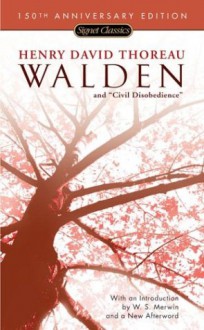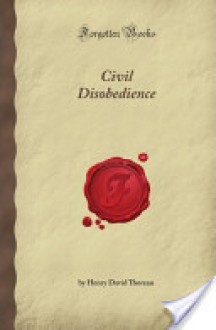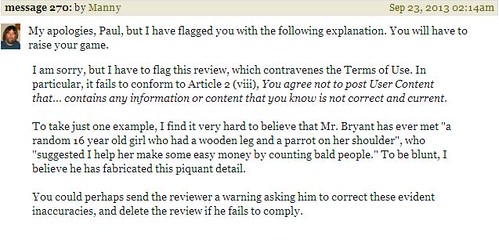
I will never, ever, ever, ever, ever, ever, EVAR understand the association between scribbling in the margins and becoming a more "active" reader. Where is the logic????
As you may have guessed, I read this for school and am referring to the abominable requirement by the vast majority of English classes called "annotating." I did not read the entirety of the book, but rather a select few of specific chapters: "Where I Lived, and What I Lived For," "Solitude," "Spring," "Conclusion," and the essay "Civil Disobedience," which is not part of Walden but is included in this volume.
First, I apologize. Great American Romantic or no, I could not get into this. *ducks* Those looking for extensive analysis, thoughtful processing, and intense scrutinizing of textual evidence should look elsewhere.
I will confess that having to read this with a figurative gun to my head played a large part in my reaction. When you're being exhorted left and right to view a writer as "great" regardless of your own independent observations, the temptation to play devil's advocate is so overwhelmingly alluring, although I prefer to think of my judgment as impartial. (ha)
It's just, here's the thing. I know these people were ahead of their times and all, that they faced social repercussions for thinking outside of the box, that they might even have kicked off future movements, like the civil rights movement in this case. (Although really, I think crediting the civil rights movement and MLK's leadership to Thoreau is going way too far--the movement happened because a giant section of the population was being unfairly disenfranchised, not because some white guy started it all with his wise white words.)
But...how about now? Doesn't that mean these "classics" are outdated? Will this stuff be relevant to ME?
One of the things that absolutely drove me up the wall was Thoreau's repeated use of "man" and "mankind" as synonyms for "human" and "humankind." I was told that this guy was progressive for his time, goddammit. (Ditto for Emerson's Self-Reliance and Other Essays, too.)
Why that bothers me so much is another issue. I think that it's because this is a book that ruminates on the wrongs and ills of society--in addition to making sweeping generalizations of how humanity should behave and fight against unjust social and political structures--at a time when feminism was already starting to become a thing, yet Thoreau blindsides an entire gender of people as if they don't fucking exist.
Again, I admit I might have tolerated this if I read it of my own will. Alas, Thoreau shall have to bear the brunt of my increasingly belligerent feminist temper tantrums.
He does, however, give several nice denunciations of slavery, for instance in "Civil Disobedience":
...when a sixth of the population of a nation which has undertaken to be the refuge of liberty are slaves, and a whole country is unjustly overrun and conquered by a foreign army, and subjected to military law, I think that it is not too soon for honest men to rebel and revolutionize.
Thank you. Now remember that half of all blacks are women too, pretty please?
Another thing is that I find Thoreau's biography (what I learned in class anyway, so I could be missing something here and I'm far too lazy to Google it) shockingly unimpressive, having only spent a single night in jail before being bailed out. Much of the philosophizing like quoted above came almost entirely from meditating in naaaaaature (well, it is a memoir) rather than firsthand social experience, and hence lacks the down-to-earth immediacy I expect when it comes to discourse on issues of any kind, particularly a classic as venerated as this.
I mean, seriously. If you're going to spend two years as a semi-solitary hermit in the wild, then of course you can afford to pass bland aesthetic judgments of no relevance whatsoever to people who actually live in the world you rejected and criticize.
Thoreau is a lot more concerned about ideals than practicality, and his commentary reflects that distance. One symptom of this is the anti-industrialist sentiments expressed, which for the most part I found so holier-than-thou and blandly naive as to be totally irrelevant to any discussion of industrialism-- decrying the ugly artificiality of human civilization and the innocent beauty of the natural world before humans come in and ruin it all, blah blah blah.
You may melt your metals and cast them into the most beautiful moulds you can; they will never excite me like the forms which this molten earth flows out into.
And all I could think to myself was, whatever.
All that said, Thoreau is a stunningly beautiful prose writer, and the neutral-literary part of myself loved going over his sentences almost as a form of therapy. "Spring" is full of glittering descriptions of what is essentially the awakening of a new world, and by extension, the awakening of the self. The lush landscape portrayed, combined with Thoreau's love of botany and science, is a real treat and fairly spoiling for a reader who loves to get immersed. Anyone with an ounce of love for nature in their veins should read that chapter, if nothing else.
Still, I think I'm gonna go with Whitman. Reading "Song of Myself" at the moment and it is delightfully inclusive, as well as earthly and relatable in a way Thoreau never was for even a single millisecond I spent with him. Perhaps one day I'll return to Thoreau without the school-incurred resentment and recognize his literary glory for myself.

 Log in with Facebook
Log in with Facebook 















